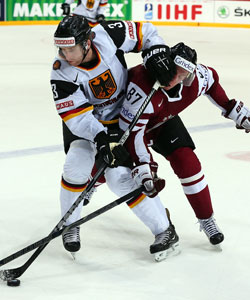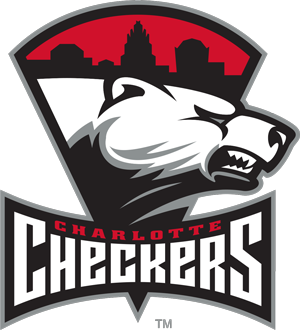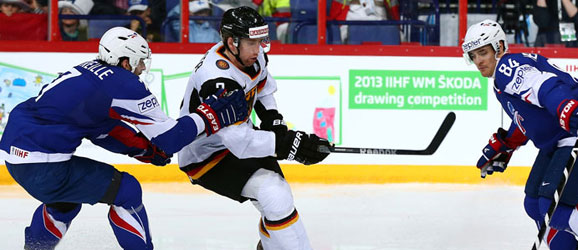For the first time in his professional career, the Checkers defenseman had made the playoffs for a North American team - a well-known scheduling conflict for the annual event. By the time Charlotte’s season had ended with a first-round loss to Oklahoma City on May 4, Germany would have already played three out of seven preliminary-round games before he could get himself to the tournament sites in Sweden and Finland.
In short, having never met the new German coach, much less participated in any of the program’s pre-tournament camps, he figured he was sitting this one out. Then, the day after Charlotte’s last game, he received a call from a German number. One day later, he was on a plane. The day after that, he was in the lineup against Austria.

For Krueger, who has been playing for German national teams since the under-16 level, the decision to play in the tournament and represent his country, something his father Ralph has also done as a player, has always been a no-brainer. While that was mostly the case once again, the different circumstances made this one slightly more difficult.
“To get knocked out (of the AHL playoffs) is very bitter and you’re not motivated to play at that point, but when you step in to a new challenge and you’re there, you’re kind of in the zone and have a lot going on,” he said. “When I got there we won three out of four, so you end up getting that good feeling back as a player and remember that hockey is fun.”
Very few AHL players get to participate in the event, with Krueger’s status helped by a German team that perennially finds itself in a sparsely-populated second tier behind the elite group that includes the likes of the United States, Canada, Russia and Sweden but is ahead of many other teams still good enough to qualify for the tournament.
That position in the international hierarchy is also part of what makes his experience unique. Unlike the relative parity in domestic leagues, going into each international game with Germany, whether it’s against a superpower or a developing program, there is an expected result.
“You just know that some teams are stronger and weaker,” said Krueger. “If you beat the underdogs, that’s normal, but if you lose, it’s a disaster. That’s where the pressure is, and coaches lose their jobs quickly because of it.”
In order to do well in the tournament each year, Germany must take care of business against those lesser-known teams and steal a victory or two away from the superpowers, who are made up mostly of NHL players. Meanwhile, Germany had just two at this tournament – Buffalo defenseman Christian Ehrhoff and Florida forward Marcel Goc.
“The last couple of years we’ve come close to beating those teams and we have beaten them in the past,” said Krueger, who helped Germany to a fourth-place finish when he was fresh out of college in 2010. “To win, you have to have an excellent game and the team you’re playing can’t have an excellent game.”
Things played our more or less as expected during the tournament, with Germany losing its games against Finland, Russia, Slovakia and the U.S. while taking victories against Austria, Latvia and France. That left the team just one point short of making into the qualifying round, which was their goal heading into the event.
Still, Krueger felt encouraged by the fact that all seven of Germany’s games were close, with a 3-0 loss to the U.S. team that included former Checkers teammate Justin Faulk and a 4-1 loss to Russia counting as their most lopsided scores, win or loss. Prior to Krueger’s arrival, Germany took Finland to overtime in its tournament opener and only defeated France by one goal in its final outing.
“Even if I think four tournaments back, this is the first time I’ve seen that so many countries can compete with each other, which shows that things are getting closer around the world,” said Krueger, a stay-at-home blueliner who had no points and an even plus/minus rating in his four games. “I was surprised.”
Going back to his first tournament, when he was set to embark his professional career without having secured a contract from Carolina, the team that selected him in the seventh round of the 2006 draft, Krueger spoke of how the exposure of playing on the international stage helped open doors to new opportunities.
Given his status as a restricted free agent heading into this summer, that could again be the case. Carolina will have to make a choice on whether to bring the 26-year-old back as an experienced depth option or turn the keys over to some of its up-and-coming prospects. The result of that choice is something Krueger didn’t have a handle on as of Thursday.
“I have no contract for next year so far, but I’ll never lose my dream to play in the NHL someday,” he said. “Whichever road is going to take me there, who knows?”






